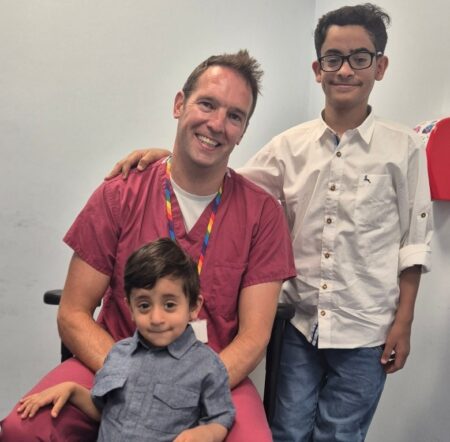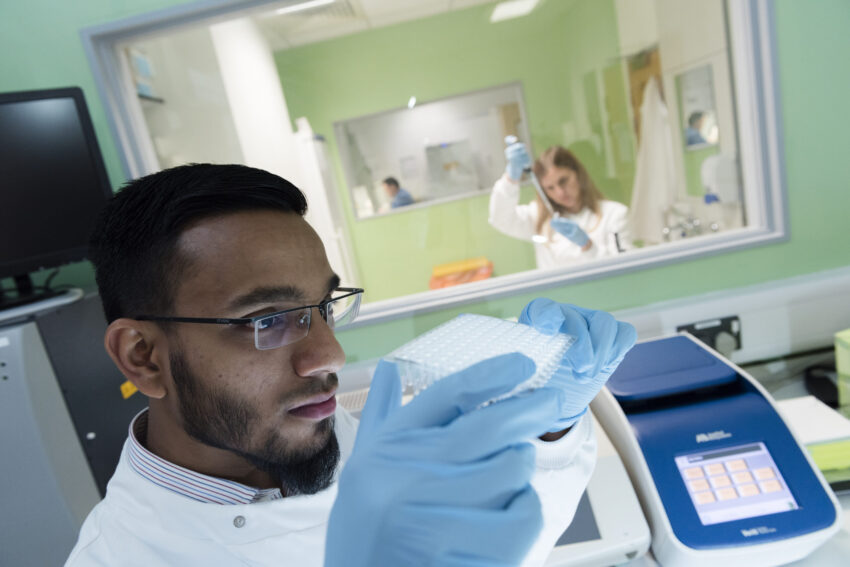As part of our children’s metabolic medicine service we offer paediatric treatment for all types of metabolic disorders (genetic conditions that disrupt metabolism from birth).
Based at Evelina London Children’s Hospital, one of only 6 centres in the UK with a specialist paediatric metabolic medicine service. We are also ranked as one of the world’s leading children’s hospitals.
As Evelina London is located at St Thomas’ Hospital, we also offer a seamless transition to our adult metabolic service, ensuring continued care.
Experts in children's metabolic conditions
Our metabolic specialists offer care for children of all ages, in both general metabolic medicine as well as complex metabolic conditions. This includes children with phenylketonuria, lipid disorders, glycogen storage disorders, galactosaemia, tyrosinaemia and mitochondrial disorders.
Our specialists work closely with other departments at our hospitals, such as our genetics and children’s liver services, as part of our multidisciplinary approach to care.

Metabolic conditions we treat
There are many different genetic metabolic disorders and their symptoms, treatments and prognoses vary widely. Our service includes diagnosis from experienced specialists, as well as acute and long-term management of metabolic disorders.
We provide care for a range of metabolic conditions in children, including:
- amino acid disorders, such as phenylketonuria (PKU) and tyrosinaemia
- carbohydrate disorders, such as galactosaemia
- fatty acid oxidation defects, such as medium chain acyl CoA enzyme dehydrogenase deficiency (MCADD)
- glycogen storage disorders
- hypoglycaemia
- lipid disorders including familial hypercholesterolaemia
- lysosomal storage disorders (LSDs)
- mitochondrial disorders
- organic acid disorders
- purine and pyrimidine disorders
- urea cycle disorders
Treatment of inherited metabolic disorders
Our specialists provide tailored treatment and link closely with other clinical teams.
Treatment is dependent on the condition and can include:
- dietary intervention (reduce or eliminate intake of any food or substances that can’t be metabolised properly)
- enzyme replacement therapy
- medications, such as to control blood pressure
Our metabolic specialists transform two brothers' lives
Our multidisciplinary team of paediatric metabolic specialists has dramatically improved the health and prospects of Abdullah and his younger brother Fahad from Kuwait, who were diagnosed with Fanconi-Bickel syndrome.
The team successfully trialled the use of an adult diabetes medication, demonstrating for the first time that it could work in children with the syndrome.


Diagnosing inherited metabolic disorders
Metabolism refers to all the chemical reactions taking place in our bodies to convert or use energy.
The majority of metabolic diseases are due to a defective single gene that results in an enzyme deficiency. This can lead to a dangerous imbalance of chemicals in the body, resulting in a build up of toxic chemicals ultimately resulting in organ damage and disabilities, if left untreated.
As inherited metabolic disorders are present at birth, some are detected by routine screening. If symptoms appear later in life, we offer a range of tests to accurately diagnose metabolic disorders including blood tests, genetic testing, imaging and functional tests using tissue biopsies.
Innovative genetic testing facilities
We are supported by 4 metabolic laboratories with national and international reputations for research and innovation, enabling rapid diagnosis. Our laboratories include:
- enzymology and biochemical genetics
- general metabolic and newborn screening
- purine research
- WellChild research laboratory

Locations
Our children's metabolic specialists provide care at these locations:
Discover our children's metabolic medicine experts
As part of a large multi-disciplinary team, our specialists work with clinicians in different teams to provide integrated care for young patients with metabolic disorders
Contact us
Call us on 020 3131 5130 to book your appointment today.
Alternatively, fill in our online enquiry form below and we will get back to you as soon as we can.